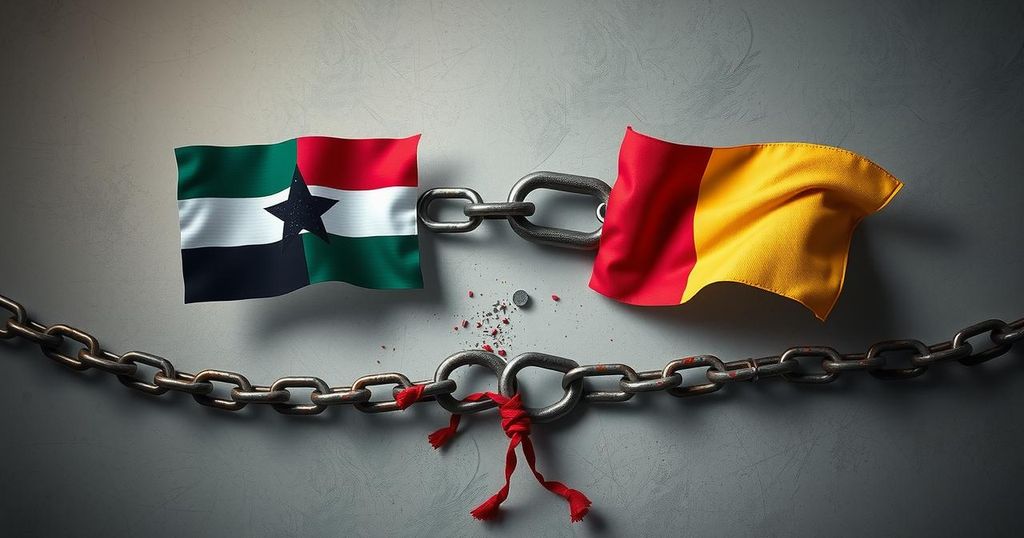Global news
AFRICA, ANGOLA, BELGIUM, BRUSSELS, BUKAVU, CONGO (KINSHASA), DEMOCRATIC REPUBLIC OF CONGO, DRC, EU, EUROPE, EUROPEAN UNION, GOMA, INTERNATIONAL RELATIONS, MAXIM, MAXIME PRÉVOT, MILITARY COUP, NORTH AMERICA, PRÉVOT, PREVOT, REGIONAL COOPERATION, RWANDA, RWANDA DEFENSE, RWANDA DEFENSE FORCE, RWANDA DEFENSE FORCES, UNITED STATES, WEST AFRICA
Jamal Walker
0 Comments
Rwanda and Belgium Break Diplomatic Relations Amid EU Sanctions
Rwanda and Belgium severed diplomatic ties amidst escalating tensions related to Rwandan support for M23 rebels in the DRC. The EU imposed sanctions on Rwandan military officials and accomplices in resource trafficking. Belgium responded to Rwanda’s actions by expelling diplomats and suspending cooperation, while peace talks in Angola approach amid concerns regarding regional stability and international law violations.
On March 17, 2025, an escalation in diplomatic strains between Rwanda and Belgium resulted in the severance of diplomatic ties, coinciding with the European Union’s implementation of sanctions targeting Rwandan military leaders and members of the Rwandan-backed M23 rebel group in the Democratic Republic of Congo (DRC). These tensions rose as M23 rebels advanced into eastern DRC, a region abundant in natural resources, capturing significant cities such as Goma and Bukavu, which has led to considerable displacement and loss of life, with government reports indicating 7,000 deaths in ongoing conflicts.
The EU’s sanctions, enacted following a meeting of foreign affairs ministers in Brussels, focus on key figures within both the Rwanda Defense Force and M23, as well as a refinery implicated in the illegal trafficking of resources from eastern DRC. This decision precedes anticipated peace discussions between the DRC and the M23 rebels slated to commence on Tuesday in Angola. An EU diplomat clarified, “This is not a ‘Rwanda-bashing’ exercise as some are trying to depict it — but a listing in reaction to those violating international [humanitarian] law.”
In a direct response, Rwanda’s Foreign Affairs Ministry announced the termination of diplomatic relations with Belgium, mandating that Belgian diplomats exit the country within 48 hours. The ministry accused Belgium of favoring the DRC in the conflict and of “systematically mobilizing against Rwanda in various forums” and undermining Rwanda through misinformation. They criticized Belgium’s purported neocolonial mindset in the statement.
Belgium reacted by declaring Rwandan diplomats persona non grata and revoking existing cooperation agreements. Belgian Foreign Affairs Minister Maxime Prévot remarked that Rwanda’s actions were disproportionate and suggested that the country opts for non-dialogue when disagreements arise. Amid these diplomatic tensions, the EU ministers condemned the presence of Rwandan forces in DRC as a violation of national sovereignty, while also acknowledging criticisms of their role in enabling conflict through the previous minerals deal that was criticized for facilitating smuggling operations.
The EU’s sanctions are deemed a preliminary measure, with officials indicating the need for further actions. Additionally, the EU is reviewing regulations regarding critical raw materials, though the potential for further sanctions remains uncertain. In a prior response to Rwanda’s actions, Belgium had suspended a cooperation program, indicating a commitment to developing measures in response to Rwanda’s territorial violations against the DRC, as Prévot had indicated previously.
The severance of diplomatic ties between Rwanda and Belgium underscores the escalating tensions arising from Rwanda’s involvement in the DRC conflict. The European Union’s targeted sanctions against Rwandan military figures serve as both a response to violations of international law and a preliminary step toward addressing the broader issues of resource trafficking and regional stability. As peace talks between the DRC and M23 rebels approach, the situation remains critical, necessitating continued observation and potential diplomatic intervention.
Original Source: www.politico.eu




Post Comment